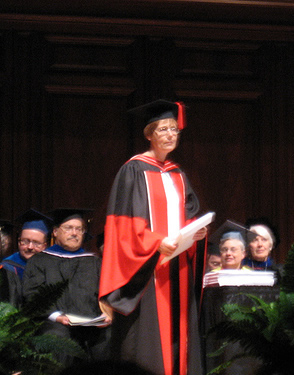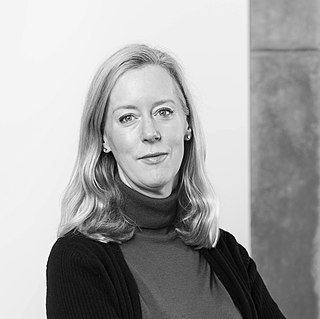The term netizen is a portmanteau of the English words internet and citizen, as in a "citizen of the net" or "net citizen". It describes a person actively involved in online communities or the Internet in general.

The Hoover Institution is an American public policy think tank and research institution that promotes personal and economic liberty, free enterprise, and limited government. While the institution is formally a unit of Stanford University, it maintains an independent board of overseers and relies on its own income and donations. Fellowship appointments do not require the approval of Stanford tenure committees. It is widely described as a conservative institution, although its directors have contested its partisanship.

Public Administration or Public Policy and Administration is the implementation of public policy, administration of government establishment, management of non-profit establishment, and also a subfield of political science taught in public policy schools that studies this implementation and prepares people, especially civil servants in administrative positions for working in the public sector, voluntary sector, some industries in the private sector dealing with government relations, regulatory affairs, legislative assistance, corporate social responsibility (CSR), environmental, social, governance (ESG), public procurement (PP), public-private partnerships (P3), and business-to-government marketing/sales (B2G) as well as those working at think tanks, non-profit organizations, consulting firms, trade associations, or in other positions that uses similar skills found in public administration.

Michael M. Crow is an American educator, science and technology scholar, and university design architect. He is the 16th and current president of Arizona State University, having succeeded Lattie F. Coor on July 1, 2002. During his tenure at ASU, he is credited with creating the New American University model.

Jessica Litman is a leading intellectual property scholar. She has been ranked as one of the most-cited U.S. law professors in the field of intellectual property/cyberlaw.

Humanistic capitalism is a concept that seeks to unite humanism, specifically the safety and health needs of people and the environment, with market forces and a market-based economy. It is often seen as a middle ground between the ideas of modern capitalism and democratic socialism.

The term digital citizen is used with different meanings. According to the definition provided by Karen Mossberger, one of the authors of Digital Citizenship: The Internet, Society, and Participation, digital citizens are "those who use the internet regularly and effectively." In this sense a digital citizen is a person using information technology (IT) in order to engage in society, politics, and government.

Caroline Haythornthwaite is a professor emerita at Syracuse University School of Information Studies. She served as the School's director of the Library Science graduate program from July 2017 to June 2019. She previously served as Director and Professor at the Library, Archival and Information Studies, School of SLAIS, at The iSchool at The University of British Columbia (UBC). Her research areas explore the way interaction, via computer media, supports and affects work, learning, and social interaction, primarily from a social-network-analysis perspective. Previously, during 1996–2010, at the University of Illinois at Urbana-Champaign (UIUC), Haythornthwaite had worked as assistant professor, associate, or full professor in the Graduate School of Library and Information Science (GSLIS).
Andrew I.E. Ewoh is a Professor of Political Science and Public Administration in the Barbara Jordan - Mickey Leland School Of Public Affairs at Texas Southern University.
Martha S. Feldman is an organization theorist best known for her work on organizational routines and, particularly, routine dynamics. Other areas of research she has contributed to include inclusive management and qualitative research methods. Feldman is the Johnson Chair for Civic Governance and Public Management in the School of Social Ecology at the University of California, Irvine She has published four books as well as numerous book chapters and journal articles.

Helen Zerlina Margetts, is Professor of Internet and Society at the Oxford Internet Institute (OII), University of Oxford and from 2011 to 2018 was Director of the OII. She is currently Director of the Public Policy Programme at The Alan Turing Institute. She is a political scientist specialising in digital era governance and politics, and has published over a hundred books, journal articles and research reports in this field.
V. Spike Peterson is a professor of international relations in the School of Government and Public Policy at the University of Arizona, and affiliated faculty in the Department of Gender and Women's Studies, the Institute for LGBT Studies, International Studies, Human Rights Practice Program, and the Center for Latin American Studies. Her cross-disciplinary research and teaching are focused on international relations theory, gender and politics, global political economy, and contemporary social theory. Her recent publications examine the sex/gender and racial dynamics of global inequalities and insecurities and develop critical histories of ancient and modern state formation and Anglo-European imperialism in relation to marriage, migration, citizenship and nationalism. Peterson is "considered to be among the most internationally important senior scholars currently working at the intersections of International Relations, Feminist and Queer Theory, and of International Political Economy."
Caroline Tolbert is an American political scientist. She is a professor of political science at the University of Iowa. She studies elections, voting, and civic engagement in American politics. Much of her work deals with peoples' capacity to use internet technology, digital technology policy, and the relationship between technology use and social participation.
Clara Penniman was an American political scientist. She was a professor of political science at the University of Wisconsin–Madison from 1953 until 1984, and from 1974 onwards she held the Oscar Rennebohm Chair for Public Administration. Penniman was also the founder and first director of the Center for the Study of Public Policy and Administration at the University of Wisconsin–Madison, which later became the Robert M. La Follette School of Public Affairs. Penniman was the first woman to be the chair of the department of political science at the University of Wisconsin, and the first woman to be elected president of the Midwest Political Science Association. She was a specialist in taxation and public finance, publishing several books and articles on these topics.
Barbara J. Nelson is an American political scientist and public policy scholar. She is Professor Emerita in the Public Policy Department of the UCLA Luskin School of Public Affairs, where she is also Dean Emerita. She specializes in social policy topics and in the study of strategic multi-stakeholder decision-making.
Nancy E. McGlen is an American political scientist and women's studies scholar. She is professor emerita at Niagara University, where she has also been the Dean of the College of Arts and Sciences. Her research focuses on women and politics in the United States.
Rita Mae Kelly was an American political scientist. She was a professor of political science at the University of Texas at Dallas, where she held the Andrew R. Cecil Endowed Chair in Applied Ethics. She was also the Dean of the School of Social Sciences at the University of Texas at Dallas.
Christina Anne Boswell is a political scholar. She is a Professor of Politics and Vice Principal for Research and Enterprise at the University of Edinburgh.

Karen Bakker is a Canadian author, researcher, and entrepreneur known for her work on digital transformation, environmental governance, and sustainability. A Rhodes Scholar with a PhD from Oxford, Bakker is a professor at the University of British Columbia. In 2022–2023 she will be on sabbatical leave at Harvard, as a Harvard Radcliffe Institute Fellow. She is the recipient of numerous awards, including a Guggenheim Fellowship, Stanford University's Annenberg Fellowship in Communication, Canada's "Top 40 Under 40", and a Trudeau Foundation Fellowship.









